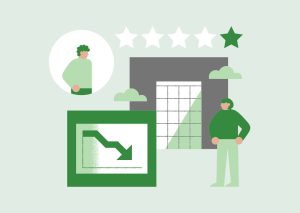
30 Greatest Lead Generation Tips, Tricks & Ideas
Generating leads – both high in quantity and quality – is a marketer’s most important objective. A successful lead generation engine is what keeps the funnel full of sales prospects while you sleep. Surprisingly, only 1 in 10 marketers feel their lead generation campaigns are effective. What gives?
There can be a lot of moving parts in any lead generation campaign and often times it’s difficult to know which parts need fine-tuning. In this guide, we will expose the top 30 techniques marketers should utilise to increase leads and revenue. These tactics have been tested over the past 7 years and have been used by our 8,000+ customers to generate more than 9.8 million leads last year.
So what goes into a best-of-class lead generation engine? First, let’s take a look into the mechanics of high-performing lead generation campaigns….
The Mechanics of Lead Generation
Before we dive into the 30 tips, we should first cover the mechanics of lead generation. The best lead generation campaigns contain most, if not all, of these components. From a tactical perspective, a marketer needs four crucial elements to make inbound lead generation happen. These include:
Offer
An offer is a piece of content that is perceived as high in value. Offers include ebooks, whitepapers, free consultations, coupons and product demonstrations.
Call to Action
A call to action (CTA) is either text, an image or a button that links directly to a landing page so people can find and download your offer.
Landing Page
A landing page, unlike normal website pages, is a specialized page that contains information about one particular offer, and a form to download that offer.
Form
You can’t capture leads without forms. Forms will collect contact information from a visitor in exchange for an offer.
The tips in this ebook will cover each of these elements so that each component is fully optimized to help you generate the most leads for your business. Now then, let’s get started.
Chapter 1: Creating Irresistible Offers
Yes. It’s one of the most powerful words in the human language. And if you think about all the things we do as marketers, it’s ultimately to get people to say “yes” to our offers.
When an offer is exclusive, scarce, or in high demand, it becomes more desirable. Whether they are whitepapers, free trials, memberships, sales promotions, or downloads, these irresistible elements can overcome a lead’s typical friction, doubt, or concern.
Why do these elements work? Because they trigger a physiological reaction that makes an offer more valuable. People need to perceive the value of your offer to be greater than what you’re asking for in return. The higher the perception of value, the more irresistible the offer. So how do you create irresistible offers? Glad you asked….
1. Use the Element of Scarcity
If you look at the principle of supply and demand, you’ll notice that when supply is limited, demand goes up. Scarcity has a psychological influence on us, making us want something even more if there isn’t enough to go around. Scarcity is great because it creates a fear of shortage, and thus a sense of urgency.
Limited Time Offers
Limited time offers are among the most popular in the scarcity category. Just think about your average car dealership. Practically every commercial is a limited time deal. “Get 0% financing before it’s gone!”
Limited Quantity Offers
When something is of limited quantity, it suddenly becomes more unique or exclusive. In some studies, limited quantity or supply offers have outperformed limited-time offers. Why? Because it’s hard to tell when an offer of limited quantity will suddenly become unavailable, while a time-based offer has a known end time. Limited quantity offers are great for not only getting people to say “yes” to your offer, but to avoid procrastination completely.
Limited Time and Limited Quantity
Groupon is the perfect example of using both tactics. All Groupon deals end within a certain time frame, and they limit the number of people who can buy a Groupon. That’s a powerful combination. The site also packages these scarcity tactics with discounting, which is another great value-add, especially for ecommerce businesses.
2. The Bandwagon Effect
It’s a natural tendency for humans to copy one another, even without realizing it — we like to be a part of tribes and social communities. So when we notice our social circle is doing one thing, we tend to follow suit. One great way to make an offer more valuable is to show that other people are participating in that offer.
Proof in Numbers
When possible, a great way to indicate how awesome an offer is to mention the number of people who have purchased, downloaded, signed up, or donated.
Examples
- Webinars: A popular educational site highlighted that 40,000 have registered when promoting a webinar.
- Blog Subscription: Similarly the HubSpot blog indicates that over 130,000 people have subscribed. This is proof that it’s a highly trustworthy and popular blog people should follow.
- Conferences: Events like SXSW and INBOUND are some of the hottest events because tons of people flock to them every year.
Just make sure your claims are not only true, but believable.
3. Leverage Newsjacking
After Prince William and Kate Middleton got married in April of 2011, no one could stop talking about Kate’s wedding dress. Within hours after the wedding, vendors began making near-identical copies or similar styles of the Stella McCartney-designed dress. Even vendors such as David’s Bridal now have a “Royal” category so you can dress “just like Kate.”
When something is buzz-worthy, it creates high demand. In situations like this, you can align offers with “what’s hot.” Companies will often leverage newsjacking for this type of technique and it works very well for offers, too.
As an example, back in 2013 people couldn’t stop talking about Pinterest. HubSpot capitalized on this craze by creating the first Pinterest ebook for business owners and marketers, How To Use Pinterest for Business. It quickly became one of HubSpot’s most successful ebooks with more than 125,000 downloads to date. Because it was the first and only ebook available on Pinterest (and they made sure people knew that), it made the offer more unique and thus more irresistible — that’s the power of leveraging both timing and popularity!
4. Focus on Creating An Amazing Title
Yes – people do judge a book by its cover. If your offer is a piece of content, such as a whitepaper, ebook, or presentation, put effort into creating an amazing title.
For an experiment, we changed the title of an ebook and ran an A/B test to see which one would perform better. We took the original title “The Productivity Handbook for Busy Marketers” and changed it to “7 Apps That Will Change the Way You Do Marketing.”

As you can see, the revised version outperformed the original by 776% at generating leads (first time submissions). Not only that, but it resulted in more customers as well. If you’re struggling to come up with the perfect headline, try using the Headline Analyzer Tool by Advanced Marketing Institute.
5. Create Offers For Different Buying Stages
The most common offer I see on most websites is “Contact Us.” Sure, you want all your prospects to talk to sales, but not everyone is ready. As you know, buyers are more likely to do their own research before even engaging with a sales rep. And, every prospect is at a different stage of exploration. Some may need more education than others. That’s why it’s important to develop different offers at different buying cycles.
Someone at the top of the buying cycle may be more interested in an informational piece like a guide or ebook, whereas someone more committed at the bottom of the cycle might be more interested in a free trial or demo. You don’t need to pick and choose; create offers for each phase, and include a primary and secondary CTA to these offers on various pages throughout your site.
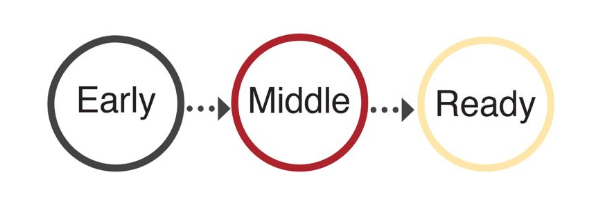
6. Avoid Corporate Gobbledygook
A professional image is necessary, but you still want to avoid the dreaded corporate gobbledygook. What is gobbledygook you ask? Great question.
These are jargon terms and phrases that have been over-used and abused rendering them meaningless (you’ll find them mostly in the high-tech industry, but everyone is an offender at one point or another). These words are meant to add more emphasis to a particular subject, but instead, they make your eyes roll.
Avoid these words when describing your offers:
- Next generation
- Flexible
- Robust
- Scalable
- Easy to use
- Cutting edge
- Ground breaking
- Best of breed
- Mission critical
To learn more, download The Gobbledygook Manifesto ebook by David Meerman Scott.
7. Use High-Value Offer Formats
Not all offers are created equal. Some “formats” of offers perform better than others at converting leads. For example, what’s more valuable, a whitepaper or an ebook?
Below are the type of offers, in order of performance, that generate the most amount of leads.
- Ebooks or Guides
- Templates or Presentations
- Research & Reports
- Whitepapers
- Kits (multiple offers packaged together)
- Live Webinars
- On-demand Videos
- Middle-of-the-funnel offers: Demo Requests, Contact Sales, RFP, Etc (more sales-ready offers)
It’s important to test different types of offers with your audience to determine what works for you. While ebooks score high on our list, you may find that reports, videos or other formats work better for you.
Chapter 2: Calls to Action that Rock
Calls to action (CTA) are the secret sauce to driving people to your offers. If your CTAs aren’t effective at capturing people’s attention and persuading them to click, then it makes the offer useless.
CTAs can be used on product pages (non-landing pages), in display ads, email, social media, direct mail and pretty much anywhere you can market your offer.
But not all CTAs are created equal. In a world where every brand is fighting for consumers’ attention, it’s critical that prospects choose your offer over your competitors. In this guide, we’ll uncover tips for creating CTAs that rock.
8. Place Your CTA Where the Eye Can See
Calls to action do best “above the fold” – the space where your web page is viewable to the user without having to scroll down. According to heat map analysis, anything “below the fold” will only be viewed by 50% of people who visit your page. Doubling impressions on your CTAs can significantly increase your lead count.
For example, notice the placement of the primary call to action on the Freshbooks homepage. Two buttons for “Try it Free for 30 Days” stand out above the fold:
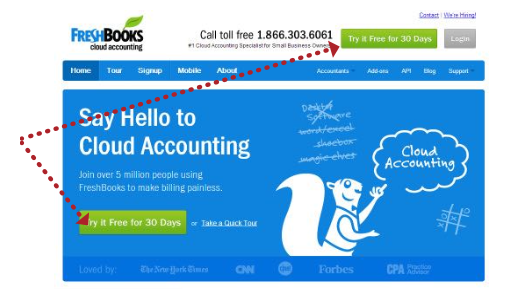
9. Clarity Trumps Persuasion
That is one of my favourite phrases. Oftentimes, marketers will put more focus on being clever than clear. Be crystal clear about what offer is in your CTA. And be specific.
If you’re giving away a free guide, say “Download our FREE guide to X.” If you’re hosting a free webinar, say Register for our FREE webinar on X. X should clearly convey a compelling benefit of receiving the offer. This is much more effective than “Download Now” or “Get a Free Article.” These simply aren’t specific enough.
Notice that this call to action below is to promote a free ebook. There is little copy in this banner ad and a button that indicates it’s clickable:

10. Use Contrast to Make CTAs Stand Out
A call-to-action is meant to stand out, so if your CTA blends in too much with your site design, no one will notice it. You want as many eyeballs to land on that call-to-action as possible, so use contrasting colours to make the CTA stand out, and more importantly, use design to make it clear it is a clickable call-to-action.
For example, check out this call to action on the Evernote website. While Evernote has a beautifully designed website, the primary call-to-action for their free trial is somewhat buried because the button is the same colour as the green background. It would be worth testing to see if a different colour – such as blue, red, or orange – would result in more clicks.
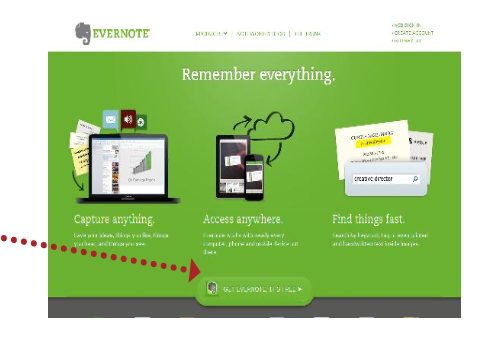
11. Link Your CTA to a Dedicated Landing Page
This tip might seem minor, but it’s incredible how often businesses miss this opportunity. Calls to action are meant to send visitors to a dedicated landing page where they receive a specific offer. Do not use CTAs to drive people to your homepage. Even if your CTA is about your brand or product (and perhaps not an offer like a download), still send them to a targeted landing page that is relevant to what they are looking for. If you have the opportunity to use a CTA, send them to a page that will convert them into a lead.
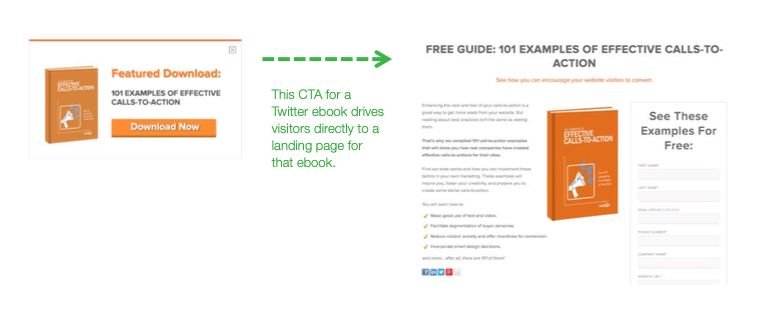
12. Promote Offers on Product Pages
CTAs shouldn’t be one size fits all. If your company offers various products or services, you may want to consider creating a different offer for each of them. Then you can place CTAs linking to each offer on the website pages that are most relevant to that offer.
In this example, a CTA for “Start using HubSpot’s SEO Tools” is placed on a product page. To generate more leads, they might also have a CTA for a “Free Guide to SEO,” because it is related to the product offering.
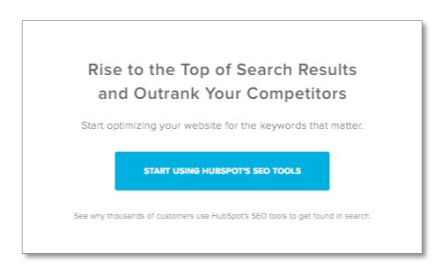
13. Thank You Pages Are Great CTA Real Estate
Even if someone completes a form on your website (thus they’ve converted as a lead), don’t stop there. Increasing engagement is also a top priority for marketers so that prospects turn into loyal fans.
Once someone reaches a “thank you page,” the page that a visitor arrives on after completing a form, use that space as an opportunity to promote more offers and content. For example, if a visitor on hubspot.com downloads a guide on email marketing, we can offer them another offer for an Email RFP for a chance to see a demo of our email marketing platform.
For example, check out how PrecallPro offers a secondary call-to-action for a demonstration on their thank-you page:
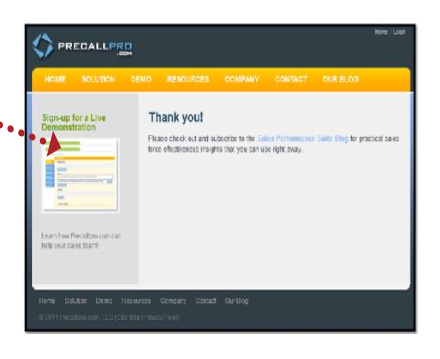
Chapter 3: Landing Pages That Convert
Landing pages are one of the most important elements of lead generation. In fact, according to MarketingSherpa’s research, landing pages are effective for 94% of B2B and B2C companies. The use of landing pages enables marketers to direct website visitors to targeted pages and capture leads at a much higher rate.
What’s great about landing pages is that they direct your visitors to one particular offer without the distractions of everything else on your website. Visitors are on a landing page for one and only purpose: to complete the lead capture form.
14. Elements of an Effective Landing Page
Landing pages, sometimes called “Lead Capture Pages,” are used to convert visitors into leads by completing a transaction or by collecting contact information from them. Landing pages consist of:
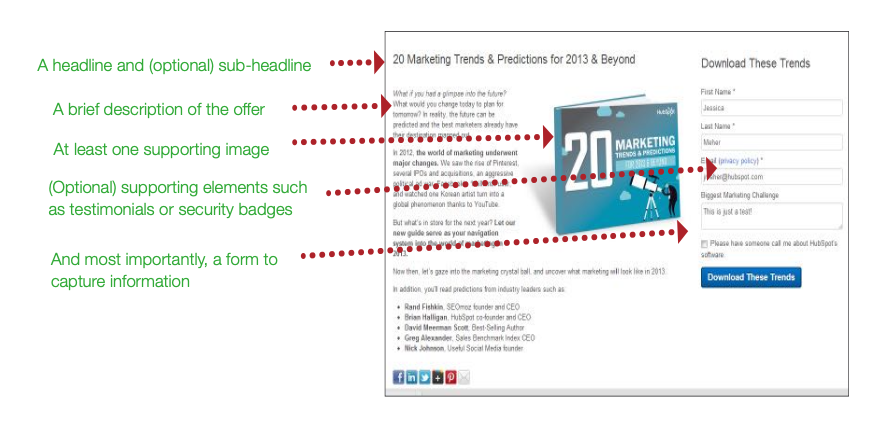
15. Remove the Main Navigation
Once a visitor arrives on a landing page, it’s your job to keep them there. If there are links on the page to move about your website, it will distract the visitor and decrease the chance of them converting on the page.
One of the best ways to increase your landing page conversion rates is to simply remove the main navigation from the page. That’s it!
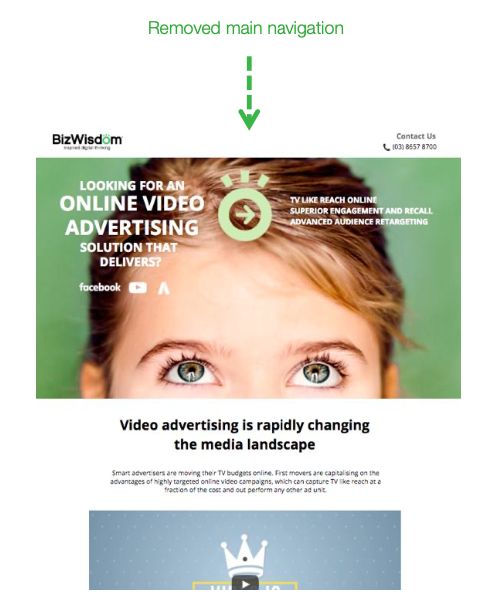
16. Match the Headline of the Landing Page to the Corresponding CTA
Keep your messaging consistent on both your CTA and the headline of the landing page. If people click on a link for a free offer and then find out there’s a catch on the landing page, you’ll instantly lose their trust. Similarly, if the headline reads differently than the CTA, it might lead to confusion, and the visitor might wonder if the CTA is linked to the wrong page.
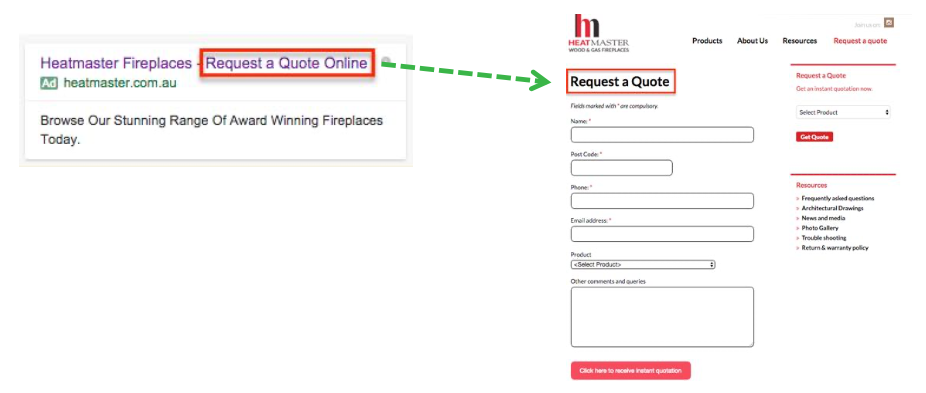
17. Less is More
I’m sure you’re aware of the rule “keep it simple, stupid.” The same applies to landing pages. A cluttered page means a distracted visitor. Be brief and to the point; it’s in the offer itself where you give more information. In addition to your headline, include a brief paragraph explaining what the offer is, followed by a few bullet points outlining the benefits of the offer.
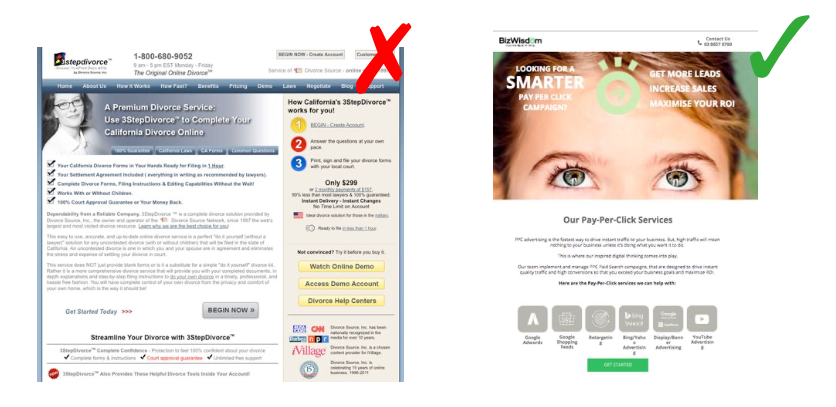
18. Emphasise the Benefits of the Offer
Make it clear in your brief paragraph and/or bullet points what the benefits of the offer are. It’s more than just listing what the offer is comprised of; it takes a bit of spin. Instead of “Includes specifications of product XYZ,” say something like “Find out how XYZ can increase productivity by 50%.” In other words, convey the value of your offer clearly and effectively.
In the example below, see how the landing page copy tells the visitor what they will receive when downloading the offer:
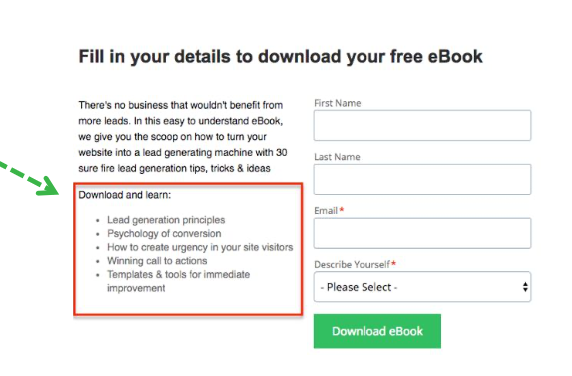
19. Encourage Social Sharing
On your landing page, don’t forget to include buttons to enable your prospects to share content and offers. Include multiple social media channels as well as email, since people have different sharing preferences. When your offer is shared more, more people land on the page, and therefore more people fill out your form and become leads!
In the example below from Moz, see how the social media sharing buttons are prominently displayed on the page along the right side:
20. More Landing Pages Equal More Leads
According to a marketing benchmarks report, companies see a 55% increase in leads by increasing landing pages from 10 to 15. The more content, offers, and landing pages you create, the more opportunities to generate more leads for your business.
At BizWisdom we have created multiple landing pages for each service & offer that we provide our customers, so that their online experience is tailored to their needs.
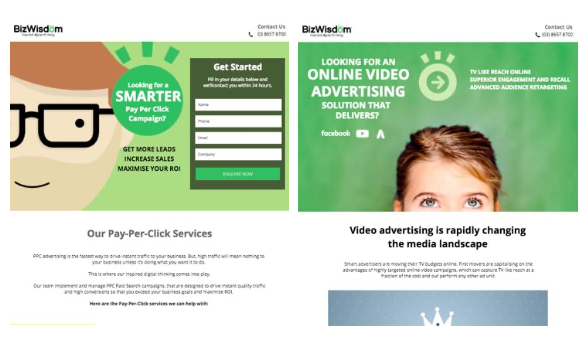
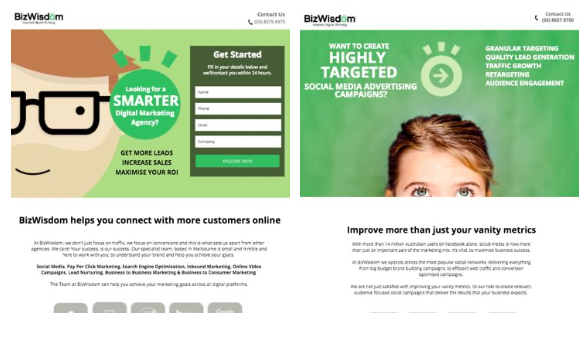
Chapter 4: Optimised Forms
Forms are the key to a landing page. Without them, there is no way to “convert” a visitor into a lead. Forms come in handy when it’s time for people to sign-up, subscribe to your site or download an offer.
The following tips will uncover how to build great landing page forms.
21. The Right Form Length
You might be wondering how much or how little information you should require with a form. There is no magic answer when it comes to how many fields your form should contain but the best balance would be to collect only the information you really need.
The fewer fields you have in a form, the more likely you will receive more conversions. This is because with each new field you add to a form, it creates friction (more work for the visitor) and fewer conversions. A longer form looks like more work and sometimes it will be avoided altogether. But on the other hand, the more fields you require, the better quality those leads might be. The best way to determine what works best is to test it.
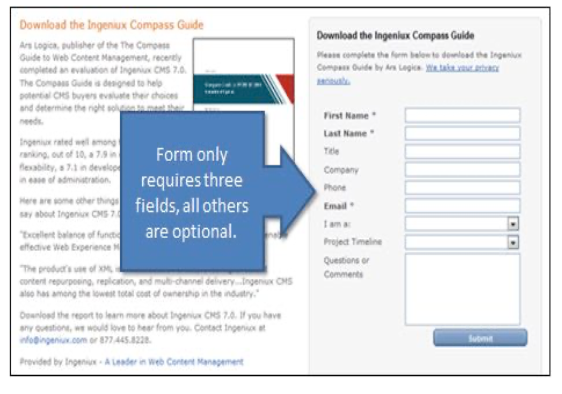
22. To Submit or Not to Submit
That is the question most of your visitors are asking. One of the best ways to increase form conversion rates is to simply NOT use the default word on your button: “SUBMIT.”
If you think about it, no one wants to “submit” to anything. Instead, turn the statement into a benefit that relates to what they are getting in return.
For example, if the form is to download a brochure kit, the submit button should say, “Get Your Brochure Kit.” Other examples include “Download whitepaper,” “Get your free ebook,” or “Join our Newsletter.”
Another helpful tip, make the button big, bold and colourful. Make sure it looks like a and appears “clickable”.
In other words, don’t do this:
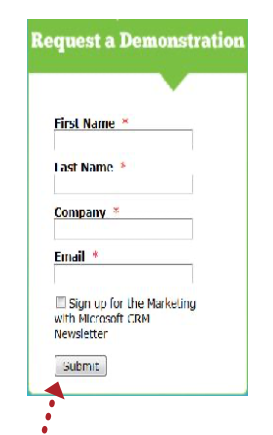
23. Reduce Anxiety With Proof-Elements
People are more resistant to give up their information these days, especially because of the increase in spam. There are a few different elements you can add to the form or landing page to help reduce a visitor’s anxiety to complete the form.
Privacy Messages
Add a privacy message (or link to your privacy policy) that indicates their email will not be shared or sold.
Security and Certification Seals
If your form requires sensitive information, include security seals, a BBB rating, or certifications so that visitors know their information is safe and secure. For example:

Testimonials
Adding testimonials or customer logos is another great to indicate social proof. For example, if your offer was for a Free Trial, you may want to include a few customer testimonials about your product or service.
24. Make the Form Appear Shorter
Sometimes people won’t fill out a form just because it “looks” long and time-consuming. If your form requires a lot of fields, try making the form look shorter by adjusting the styling.
For example, reduce the spacing between fields or align the titles to the left of each field instead of above it, so that the form appears shorter. If the form covers less space on the page, it may seem as if you’re asking for less:
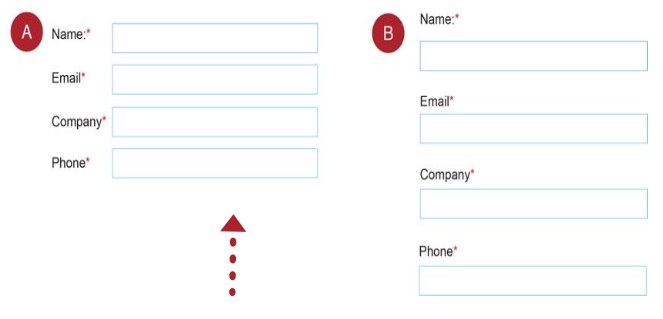
Chapter 5: Multi-Channel Lead Generation
Your website isn’t a silo. Marketers must utilise many other channels in order to maximize their lead generation efforts. In this sense, a channel might be a retail store, a website, a social media platform, an email, or a text message. The objective is to make it easy for buyers to research, evaluate and purchase products in any way that is most appropriate for them. It’s all about having the right marketing mix.
In this last chapter, we will briefly cover a few channels that help businesses generate the most amount of leads.
25. Blogging Brings in the Leads
According to HubSpot’s recent Benchmarks report, companies that blog 6-8 times per month double their lead volume. This proves that blogging is a highly effective channel for lead generation.
In every blog post, include hyperlinks to landing pages within the copy of the post, as well as a prominent call-to-action.
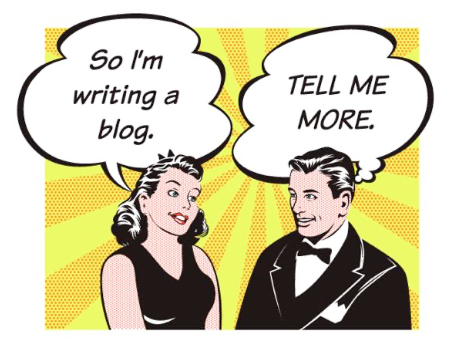
26. Email Marketing
Many businesses may think that email marketing is only best used when communicating with existing prospects and customers. Not so! Email can be a great channel for new lead generation. Here are some ways you can use email to generate more new prospects.
Focus on an opt-in strategy.
If you’re buying email lists and spamming your prospects, no one will want to share your email with others. They will only want to unsubscribe! The first step to email lead generation is to make sure you have happy subscribers that enjoy receiving emails from you.
Send people valuable offers.
If you send really interesting or valuable offers – whether it’s downloads, discounts or educational content – people will more likely share your emails with their friends or colleagues.
Give people the tools to share.
Don’t forget to add a “Forward to a Friend” link or social media sharing buttons within each email so people are encouraged to pass it on.
27. Social Media
Social media isn’t just for liking funny pictures or tweeting what you ate for breakfast. Social media is an emerging channel that many businesses are taking advantage of. Here are some great tips for generating leads on social networks.
Build a loyal following.
Building a relationship with potential customers is a critical first step. Social media connections are really about people-to-people, not always company-to-individual. Get to know your audience online, communicate and share information. In order to generate leads, you need to have human interaction with others.
Remember, social media is a dialogue.
Companies that only use social media to blast out messages about themselves aren’t using social channels effectively. The goal is to interact with others and be helpful. When you share content on social media, don’t always post something that relates to your company. Share links to other interesting things you’ve found online. People will be very thankful you are noticing their work, too!
Influence connections for content sharing.
Publishing and sharing content that directs traffic to targeted landing pages is the single biggest lever to increase lead generation through social media. Share your new content offers by posting links to landing pages, and in addition, share blog posts, discounts, and other great resources.
28. Organic Search
While promoting your offers in many channels is crucial for lead generation, it’s also equally important to make it easy for people to find your landing pages through search engines. To do this, you need to apply search engine optimization (SEO) best practices to your landing pages, such as:
Determine Your Keyword Focus
Pick a primary keyword for each landing page and focus on optimizing that page for that word. If you oversaturate a page with too many keywords, the page will lose its importance and authority because search engines won’t have a clear idea of what the page is about.
Place Keywords in SEO Elements
Place your primary keywords in your page title, headline and sub-headline. These areas of content have greater weight to search engines.
Use Keywords Naturally
Include the keywords in the body content but don’t use them out of context. Make sure they are relevant to the rest of your content and that the language you use reads naturally.
Don’t Forget to Optimise Your Images
Include keywords in the file name of images (e.g. my-keyword.jpg) or use them in the ALT tag, which is used to describe the contents of the image.
Include Keywords in URLs
Keywords can also be understood by search engines when they appear in your URLs. Use dashes to separate them rather than underscores where appropriate.
29. Use CTAs within Offers
Your offers themselves are great channels for lead generation. For example, if you downloaded this blog as an ebook, we have included information and CTAs about the lead generation services that we offer at BizWisdom. I’m sure you have noticed them by now. As people share this ebook, our message is likely to reach new prospects who could benefit from these services.
30. A/B Testing
While this isn’t a channel per se, it is a great way to increase leads across all channels and tactics. A/B testing can be used in calls to action, landing pages, email marketing, advertising, and more. According to HubSpot research, A/B testing your landing pages and other assets can help you generate up to 40% more leads for your business. When done correctly, A/B testing can provide a huge competitive advantage for your company.
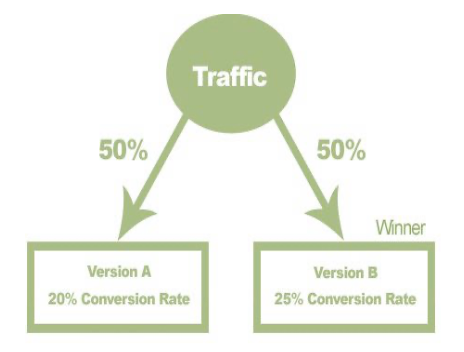
Conclusion
Generating leads online has the power to transform your marketing. Using great offers, calls to action, landing pages and forms – while promoting them in multi-channel environments – can reduce your cost-per-lead while delivering higher-quality prospects to your sales team.
The basics herein are just the beginning. This guide contains many best practices for every aspect of lead generation to help bolster your conversion rates, but these tactics are only the tip of the iceberg. Continue to tweak and test each step of your inbound lead generation process in an effort to improve lead quality and increase revenue.
Now go, young grasshopper, on your way to becoming a lead generation master.
This guide was produced in partnership with Hubspot.

